You’re sitting in front of your computer, trying to work on one of the many goals you want to accomplish this year, but you can’t seem to start.
You keep opening new tabs on your browser, searching random things, and checking your phone, even though you told yourself you wouldn’t go down that rabbit hole.
You begin to feel overwhelmed and don’t know where to start; so you get up and find something fun and less stressful to do.
Does this sound like you?
If so, don’t worry—you’re not alone.
Many of us have trouble taking action and accomplishing our goals, especially when we feel overwhelmed or feel like an impostor.
But the good news is that there are ways to overcome this feeling and start with your first step.
- Why Is It So Hard To Take Action?
- Tip #1: Believe in Yourself
- Tip #2: Prioritize Your Tasks
- Tip #3: Close Your Knowledge Gap
- Tip #4: Create a Plan
- Tip #5: Overcome Your Fears
- Tip #6: Get Rid of Perfectionism
- Tip #7: Release Negative Self-Talk
- Take One Small Step at a Time
- Questions You May Have
Why Is It So Hard To Take Action?

There are a few reasons why it can be challenging to take action and get started on your goals.
- You may feel you’re not good enough or worthy enough.
- You may lack confidence.
- You may be afraid of failing.
- You may feel like you don’t have the time or sufficient resources.
- You may be overwhelmed by the number of options and don’t know where or how to start.
- You don’t have a plan.
All of these reasons are valid, but they’re also things you can work on to break through your stagnant state.
In this article, I’ll share 7 tips on how to take action and accomplish what you want in life without feeling intimidated.
Tip #1: Believe in Yourself

One of the biggest reasons people don’t take action is because they don’t believe they can accomplish their goal.
This is unfortunate because I believe this step is the most crucial one in taking action.
Look at the situation this way. If you don’t believe in yourself, then who will?
You need to be your biggest cheerleader and know that you can achieve anything you put your mind to because you set your limits. That simply means that however far you see yourself getting is how far you’ll get if you don’t let anything or anyone stop you.
Nobody is born a natural millionaire or genius; we all become that through taking action toward our goals and consistently improving our skills.
“Whether you think you can, or you think you can’t—you’re right.” — Henry Ford
This doesn’t mean that your journey will be a smooth ride, and you won’t face challenges or obstacles along the way. Unfortunately, that’s not how you’ll elevate to the next level. When those challenges present themselves, your belief system/foundation can take some rigorous shaking without collapsing.
At any stage of your journey, but more importantly at the beginning, no one is going to believe in you if you don’t believe in yourself first.
It’s time you begin to show up, step up, and be your number one fan.
Recommended Article: 5 Reasons Why Self-Confidence Is Important For Your Success
Tip #2: Prioritize Your Tasks
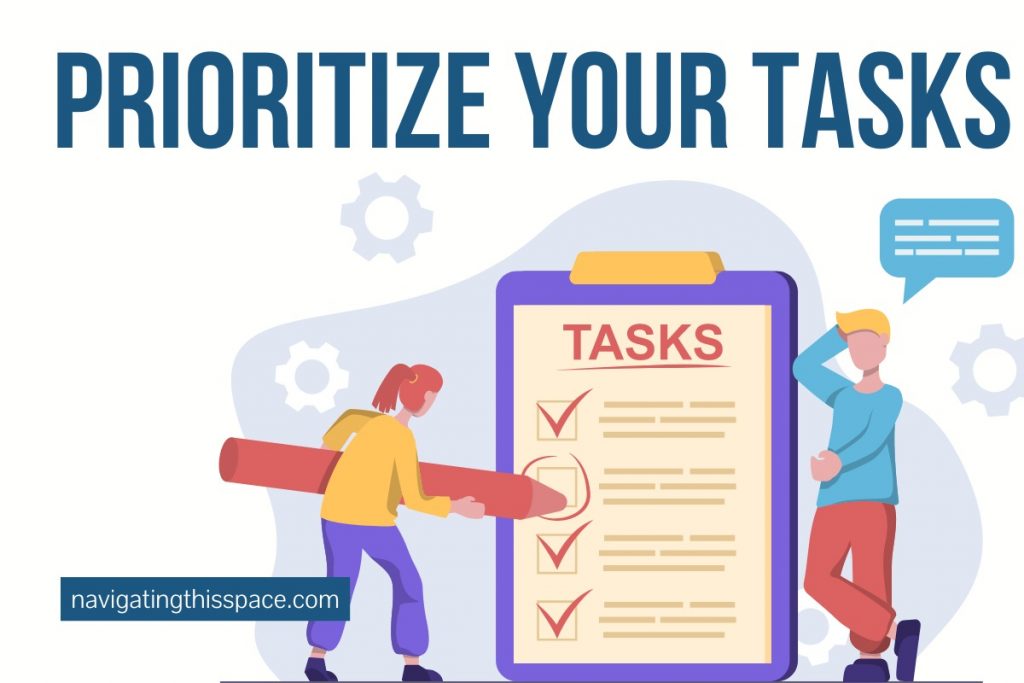
If you keep waiting for the perfect time, for all the stars to align and your energy to be at its ultimate high to start, you’ll never start.
There’s always something that needs to get done that takes precedence over you working on accomplishing your goal. There are always dishes to wash, a room to vacuum, a friend needing to be consoled, or that new Netflix series you’ve been waiting for is finally released.
The truth is, you’ll never find the perfect time or feel 100% ready to start because life will always happen.
“Waiting for perfect is never as smart as making progress.” — Seth Godin
The perfect time doesn’t exist!
You have to be the driving factor in your life and set priorities. This means rating your tasks on a level of “I can do this another time” to “This needs to get done right now.” Failure to create a hierarchy of your tasks will land your entire to-do list in one of the categories mentioned.
For example:
Yousef plans on starting a fashion clothing business. Still, whenever he sets aside a specific date and time to work on bringing his idea to life, he gets sidetracked by other daily life tasks like doing laundry, cooking his meals, or washing the two dishes he forgot in the sink. Unfortunately, when he finishes all those tasks, he’s no longer in the mood or has the energy to do anything more. So he ends up not working on his business at all.
A major reason this happens is that he doesn’t have a priority system to organize his thoughts or tasks; so every task feels like it’s of equal importance, when in reality, most of them can be pushed off until later.
Don’t get caught up in the time-consuming tasks of everyday life that leave you no time to work on yourself and your personal goals. Push things off till the next day to free up space for the things that will get you closer to achieving your goals.
Of course, this doesn’t mean you should ditch all your responsibilities. It simply means that you should learn how to juggle your time between what’s important and what can wait.
Tip #3: Close Your Knowledge Gap

When you feel like you don’t know enough to start or are not qualified enough, it creates a major obstacle that will prevent you from taking action.
The key to combating this feeling is to learn everything that you can about the task at hand, so you feel more confident and comfortable starting your journey.
Feeling like you don’t know enough and not knowing the basics are two very different things.
If you don’t know how to do something and it’s important to the progression of your goal, then set aside time to learn that information.
The fewer questions you have to begin, the more confident you’ll feel to start. However, you will not know everything about your field or have all the answers before starting.
Experience is and will be the greatest teacher you’ll ever have.
The knowledge you’ll gain from doing the work yourself is incomparable to any amount of research or reading you can do beforehand.
“There is no substitute for experience.” — Marilyn L. Rice
Tip #4: Create a Plan
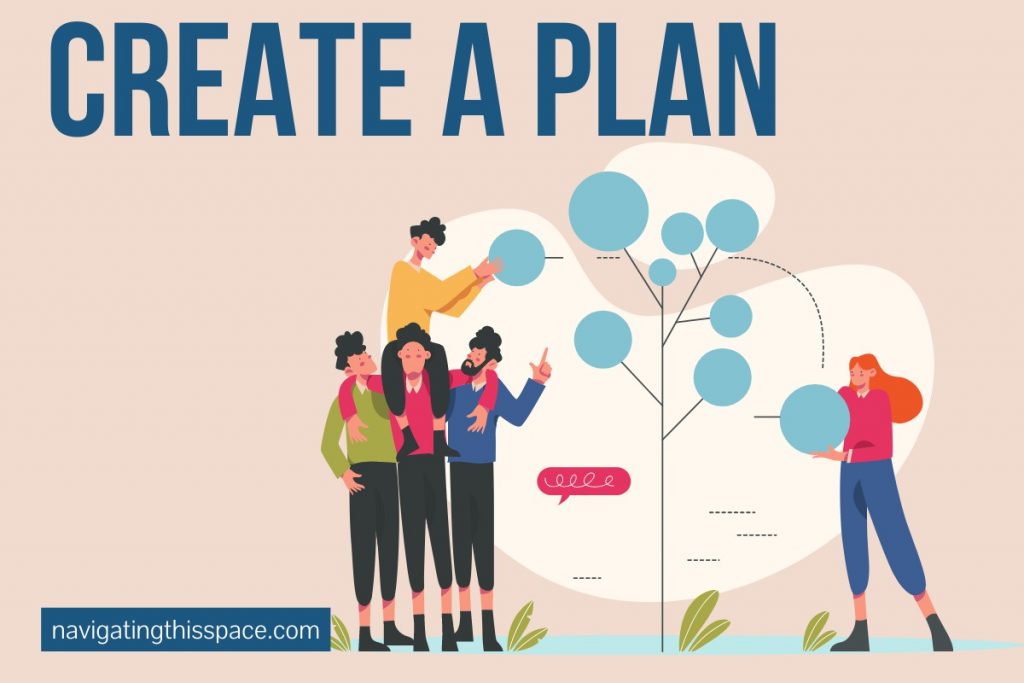
Taking action without a plan is like showing up to a ball in your pajamas.
You might get lucky and have a good time. But there’s a high possibility that you’ll feel unprepared and out of place, and your overall experience won’t be as great as it could have been.
Take the time to plan what you need to do so that you know exactly what steps you need to take when it’s time to execute. This will minimize the feeling of being overwhelmed and also prevent you from mindlessly working with zero progress.
When you don’t plan and just go with the flow, you’re more likely to make mistakes that could have easily been avoided. Knowing what needs to be done and in what order will make the task feel less daunting and more manageable.
Creating a plan gives you a sense of direction and prevents you from getting lost along the way.
What’s included in a good plan?
– The detailed, specific goal or outcome that you want to achieve
– A date to achieve that goal (deadline)
– A step-by-step guide (milestones)
– Small daily or weekly tasks to achieve the milestones
– Any tools or resources you’ll need
– Possible roadblocks and solutions
By creating a plan, you give yourself a better chance of success by not only taking action but completing the task at hand and achieving your goal.
Creating a plan is creating a roadmap to success.
Recommended Article: How To Create A Successful Plan For Next Year
Tip #5: Overcome Your Fears
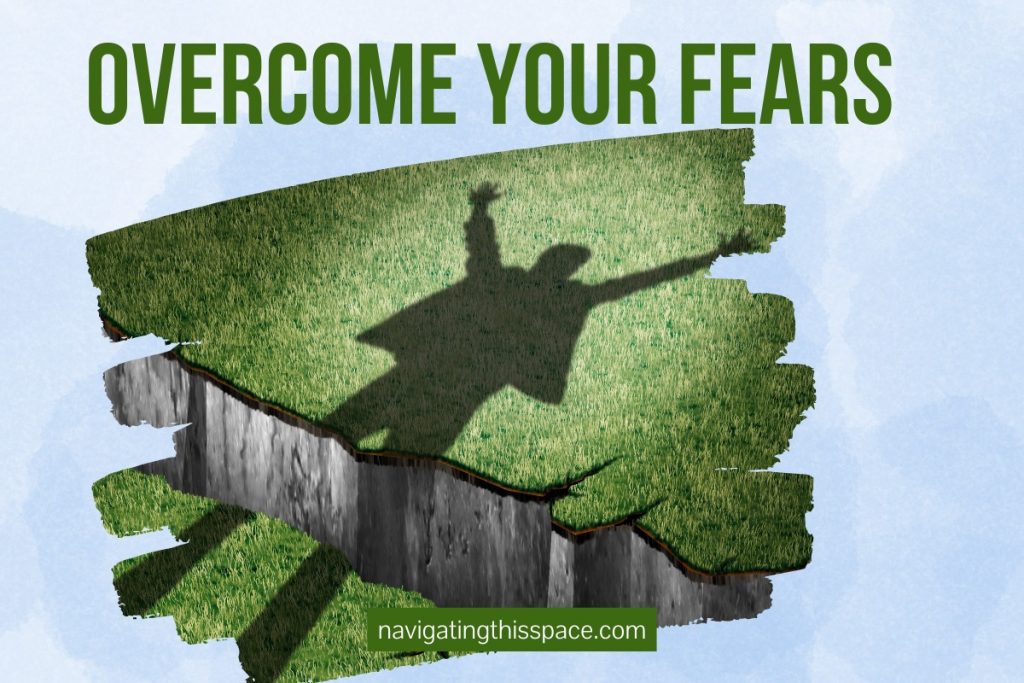
Fear is a tremendous driving force, but the issue is that it may drive you in the wrong direction.
Fears often hold us back from taking action on things we want to do. We tell ourselves all the horrible outcomes that could come from taking that first step, and we allow it to prevent us from starting.
“Feel the fear and do it anyway.” — Susan Jeffers
The key here is not to let your fears control you but to face them head-on, so they don’t have power over you to push you in the wrong direction.
Learn how to repurpose your fear and use it to your advantage.
For example:
If not having expert-level skills and knowledge are holding you back, then use that fear as your driving force to gain the knowledge and skills you need to become an expert in your field.
If you fear failure, use that fear to remind yourself to stay focused and push yourself a little further.
Repurposing your fears will remove the roadblocks they’ve created and turn them into a tool that will help you succeed. This simple change of mindset will allow you to look at your fears in a new light and help you move closer to taking action.
Overcoming your fears means changing how they affect and influence your behavior. It means stepping outside your comfort zone, and it means taking risks.
It might be terrifying, but it’s worth it to finally take action on the things you want to achieve in life.
Recommended Article: How To Overcome Fear Of The Unknown
Tip #6: Get Rid of Perfectionism
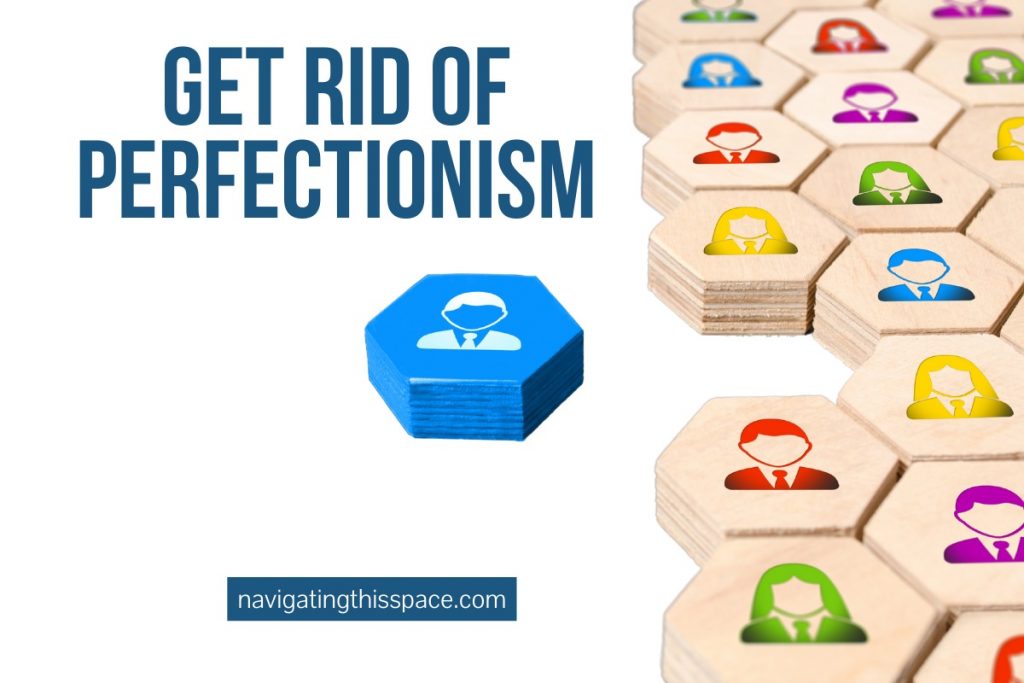
The need to have everything perfect before taking action is another common roadblock preventing you from moving forward.
As humans, we naturally want to do things perfectly the first time around, but perfectionism is an unrealistic and unattainable goal.
“Perfectionism is self-destructive simply because there is no such thing as perfect. Perfection is an unattainable goal. Additionally, perfectionism is more about perception—we want to be perceived as perfect.” ― Brené Brown
Accepting reality—that everything is constantly changing and that nothing will ever be perfect—is an essential part of taking action.
If you wait for the perfect situation or timing, you’ll never get anything started or finished.
Just do it and make the necessary adjustments later to achieve your goal, not perfection. You can always go back and revise. However, if you don’t start, you’ll never get anywhere.
Ridding yourself of the need for perfectionism doesn’t mean that you should settle for mediocrity. It means that you should strive for excellence and completion instead of perfection.
Excellence and completion are attainable, and they also leave room for growth and improvement.
By aiming for excellence and completion instead of perfection, you give yourself the freedom to make mistakes and learn from them. You also allow yourself to move forward instead of being stagnant.
Your goal achievement journey is not about being perfect; it’s about taking action, learning from your experiences, and applying your new knowledge to achieve your goals.
Tip #7: Release Negative Self-Talk
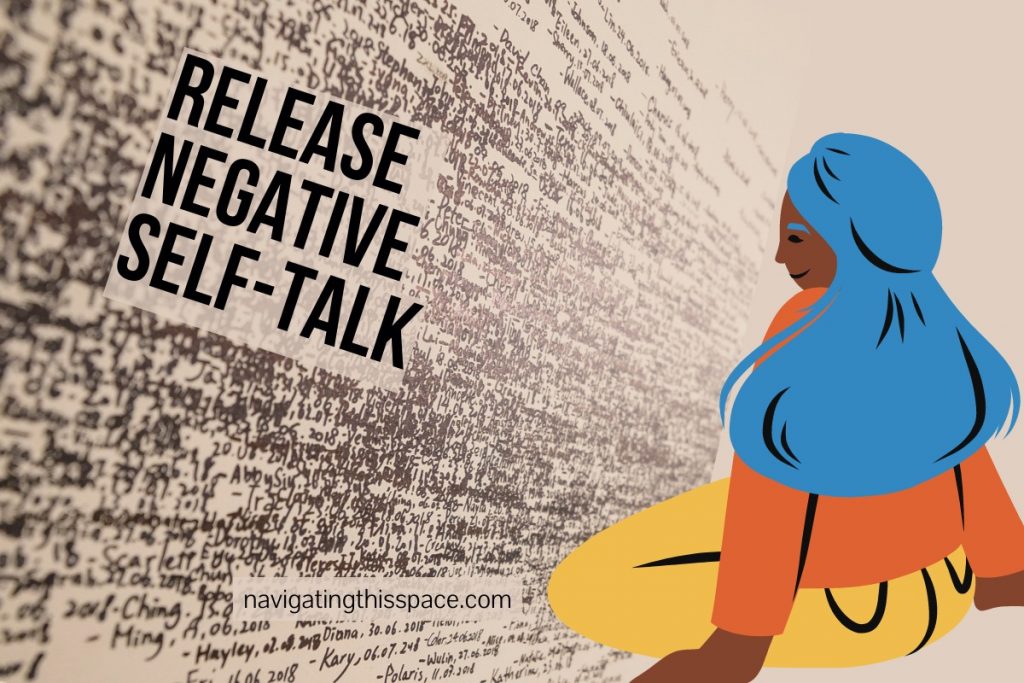
Last but certainly not the least of all the practical tips is that you need to release negative self-talk.
Many times, we talk ourselves out of taking action because we don’t think we’re good enough.
That little voice in our heads can become so loud that it’s hard to concentrate on anything productive.
“I’m not smart enough.” “I don’t know what I’m doing.” “This is too hard.”
Sound familiar? These are just some of the negative things we tell ourselves when feeling overwhelmed.
Negative self-talk like this needs to be replaced with positive, empowering statements that will reinforce your belief in yourself.
“I can do this because…” “I’m smart and capable enough to achieve…” “This may be hard, but I know I can do it because…”
These positive statements will help increase your confidence and motivation, which are essential when taking action.
What you think is what you’ll become. So if you’re constantly doubting yourself and thinking you’ll never be good enough, then you’re killing your chances of becoming the best version of yourself; someone who takes action and gets things done.
The takeaway here is that changing how you talk to yourself is a powerful tool that can help you overcome feelings of being overwhelmed which are preventing you from taking action.
Learn how to tackle your negative self-talks and change them, so they don’t become too loud and take over your life.
You deserve to achieve your goals and dreams, so don’t let anything stand in your way—including yourself.
Recommended Article: 5 Tips on How Positive Self-Talk Can Change Your Life
Take One Small Step at a Time
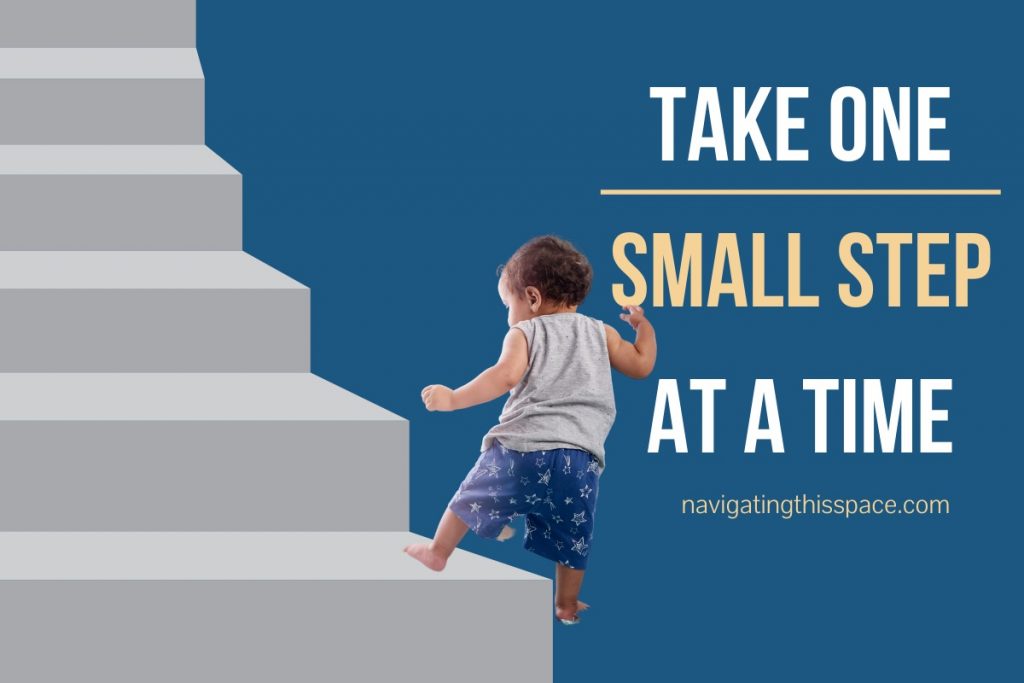
“The journey of a thousand miles begins with a single step.” — Lao Tzu
Taking action toward creating the life you want means that you have to start somewhere. Start by taking baby steps.
You can’t do everything all at once, and it’s counterproductive to try and do it all at once.
Remember the plan you created in tip number four?
That’s your guide. That’s the first step in building systems to help you achieve your goals. That guide has a structure because there are certain things you need to do in a specific order for it to be effective or to make sense.
Start with the first item on your list and work your way down. Dedicate a certain amount of time each day or week to taking action steps toward your goal.
And as you complete each task, reward yourself because you’re one step closer to achieving your goal. Recognizing and celebrating that you’re making progress will keep you on track.
To move in the right direction, complete that important task, reach a milestone, or even start working on your goal, you need to take action.
Start with basic techniques and move on to more complex ones as your abilities improve. Be patient, work smart, and realize that whatever you think you lack now is a matter of time and experience away from being mastered.
You can do it—but only if you start taking action now.
“The path to success is to take massive, determined action.” —Tony Robbins
Questions You May Have
Why is taking an action important?
There is no magic pill or spell that will make your dreams come true—you have to put in the work, take consistent action, and create good habits to see results. Taking action is important because it’s the only way to move forward and make progress toward achieving your goals. You can’t just sit around and wait for things to happen; you have to put in the effort.
What is taking action?
Taking action means taking steps toward achieving your goals. This can involve anything from researching and planning to doing the work and taking steps to make your dreams a reality. It’s about putting in the work and not giving up even when things get tough.
Why taking the first step is very important?
The first step is the starting point. It’s what gets you moving in the direction of your goal and sets the wheels in motion. Once you take that first step, everything else starts to make sense and fall into place. This gives you a more detailed roadmap to follow to achieve all your goals.
What are some things I can do to take action?
1. Set a very detailed goal.
2. Break that goal into small, manageable steps called milestones.
3. Create a plan of action (tasks) with deadlines.
4. Start working on your first task
Pin It!






Great post on achieving anything! love all the tips you give, especially having a plan in place to reach the goal. I look forward to reading more articles!
Love these tips for being able to accomplish anything! Believing in yourself and having a plan especially seem crucial. I look forward to reading more articles!
How many times… for those of us with ADHD – this is almost an essential tool. We have to have a plan or nothing gets done that isn’t a preferred activity. LOL
Such great (and detailed!) advice – I think #1 is probably the most important 😉
These are wonderful easy tips. Great list